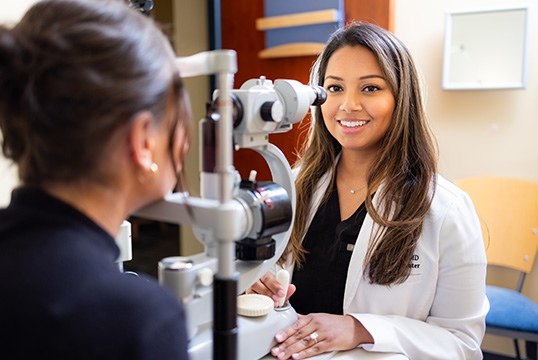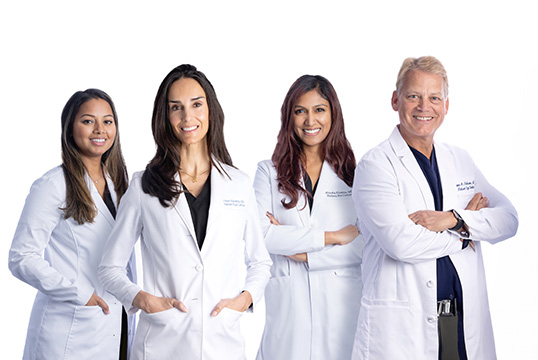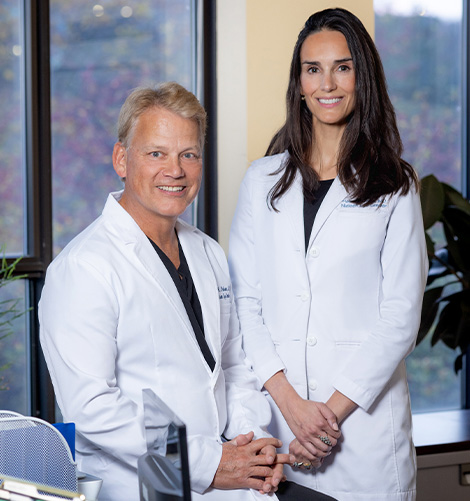Jump to Section
- What Is Macular Degeneration?
- What Causes Macular Degeneration?
- Real Patients. Real Reviews.
- Symptoms Of Macular Degeneration
- Macular Degeneration Treatment
- Featured Videos
- Macular Degeneration Prevention
- Request A Macular Degeneration Consultation
- Frequently Asked Questions
- Our Providers
- Locations Near Boston, Ma
- Related Blog
What Is Macular Degeneration?
The retina is the lining of tissue in the back of the eye. The retina is where light is focused after it passes through the lens – the retina then sends feedback through the optic nerve to the brain, where an image is processed. The middle part of the retina is called the macula and is responsible for sharp central vision, or the type of vision you use when you read or drive. Patients develop macular degeneration when the macula breaks down, causing distortion, blurriness, or dark areas in the central vision.
There are two types of macular degeneration, called “wet” and “dry;” age-related macular degeneration occurs in both forms. Dry macular degeneration is most common and involves thinning of the retinal tissues, causing gradual vision loss. Wet macular degeneration is less joint but occurs when abnormal blood vessels form underneath the retina, which may leak fluid or blur vision. It can be much more rapid and severe than dry macular degeneration, accounting for nearly all cases of legal blindness in macular degeneration patients.
What Causes Macular Degeneration?
Macular degeneration is the leading cause of blindness in people aged 55 and older, and older people are at the highest risk of developing macular degeneration. However, it may also be hereditary and affect some families but not others. Some studies suggest there may be a link between diet and macular degeneration, with high levels of dietary saturated fats having a higher incidence of macular degeneration. Hypertension or smoking tobacco (or even secondhand exposure) may also play a role in wet macular degeneration. Wet age-related macular degeneration is not linked to other common eye conditions or risk factors like floaters, dry eye, or cataracts.
Symptoms Of Macular Degeneration
Age-related Macular degeneration is not noticeable in the early stages. Typically, the most noticeable symptom is a decline in vision. An ophthalmologist can detect macular degeneration during routine eye exams by examining the retina to look for the development of any new blood vessels in or under the macula. However, symptoms that affect the center part of your vision, like distortion of straight lines, color perception changes, or dark, blurry, or white-out areas, are cause for concern and should be assessed by an eye doctor immediately.

Macular Degeneration Treatment
There is no cure for macular degeneration, but it can be managed with the help of your ophthalmologist. However, treatment will not restore your vision; some degree of vision loss is expected in macular degeneration patients. Wet macular degeneration can be treated with laser surgery to stop or slow leaking blood vessels, but dry macular degeneration requires lifestyle adjustments and prevention to prevent vision from worsening. Our team will help you learn more about your options during a consultation.
Featured Videos
Video libraryMacular Degeneration Prevention
Preventing macular degeneration is the best way to maintain healthy vision. You can take steps to prevent macular degeneration, such as eating a healthy and varied diet, getting regular eye exams, reducing blood pressure, and protecting your eyes from excessive amounts of light (including blue light). If you’re at risk, these may be ways to slow its progression.
Request A Macular Degeneration Consultation
To learn more about preventing and treating macular degeneration, contact the Nielsen Eye Center by calling our Quincy, MA, area locations or filling out our online form.
Frequently Asked Questions
How long does macular degeneration take to go blind?
What can you expect when you have macular degeneration?
Is macular degeneration a big deal?
What is the best drink for macular degeneration?
What percentage of people with macular degeneration become blind?
Can I prevent macular degeneration?
What to expect when you have macular degeneration?
What percentage of people with macular degeneration go blind?
How do you top macular degeneration from progressing?
What are the early signs of macular degeneration?
Is macular degeneration hereditary?
Are there any effective treatments for macular degeneration?
How does macular degeneration affect daily life?
Can diet and nutrition impact macular degeneration?
OUR PROVIDERS
Our team of eye doctors includes some of the foremost experts in laser vision correction and eye surgery in the greater Boston area. We look forward to helping you maintain healthy and clear vision for years to come. Learn more about our leading providers and the high level of service you can expect at the Nielsen Eye Center.
MEET OUR TEAM
Locations Near Boston, Ma
Please schedule your appointment today at one of our four convenient offices on the South Shore. Serving the greater Boston area, our locations in Quincy, Weymouth, Norwell, and Norwood are here to provide exceptional eye care tailored to your needs.
DISCOVER OUR CONVENIENT
LOCATIONS NEAR BOSTON, MA
Schedule your appointment today at one of our four convenient offices situated on the South Shore. Serving the greater Boston area, our locations in Quincy, Weymouth, Norwell, and Norwood are here to provide exceptional eye care tailored to your needs.










